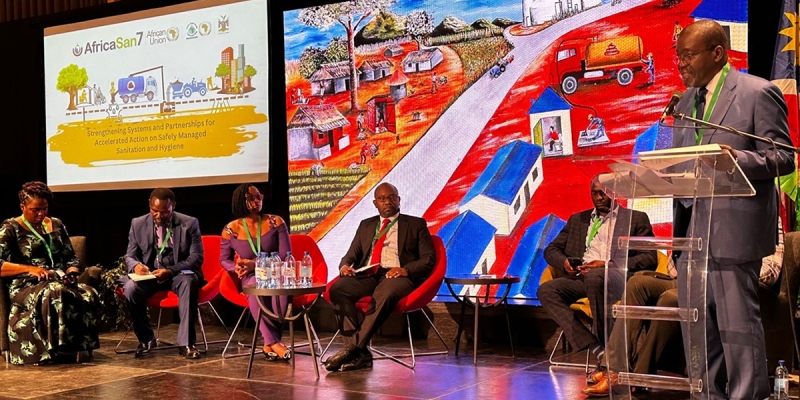A panel discussion on accelerating and sustaining access to sanitation services took place on Tuesday, November 6. The session was co-moderated by Sylvain Usher, Executive Director of AAEA and Yvonne Magawa, Director of ESAWAS.
Among the panelists was the Pan-African Sanitation Association, represented by Sandrine Nanga from Cameroon. She was invited to speak on the key aspects that motivate private sanitation players to improve and expand their service provision.
Responding to the moderator's question, Sandrine Nanga identified three key levers for improving service quality. Regulation, capacity building and finance.
On the regulatory front, she stressed the importance of providing the sector with regulatory instruments that will enable better structuring and organization of private operators. These instruments include approvals and licenses. Citing the example of Yaoundé in Cameroon, she asserts that "every company must obtain an approval and a license before starting any emptying activity. This enables the municipality to make sure that it is formal, but also that it has quality work tools, and that sanitation workers, who are generally marginalized, are socially protected and benefit from employment contracts".
She asserts that as far as capacity building is concerned, she maintains that it is "the fundamental element for improving the service delivery of private operators, as it gives them the technical, managerial and marketing tools to boost their businesses and make them leaders. Capacity building also gives private sector operators the ability to better identify the risks of inappropriate business practice, to protect the environment, to protect themselves and to protect communities.
Turning to the financial aspect, Sandrine Nanga points out that "private companies in the sanitation sector are generally vulnerable. They need to be supported through the establishment of Public-Private Partnerships, as in Niamey in Niger, or Yaoundé in Cameroon, where the management of the faecal sludge treatment plants is handled by the faecal emptiers, thereby strengthening and diversifying their income", she emphasized. She went on to plead for support for business development, through tax measures to reduce customs duties on truck imports."
In addition to these aspects, Sandrine Nanga spoke of the responsibility of sanitation players to the community.
Firstly, participation in data collection. She pointed out that, in Cameroon, each truck is equipped with a geolocation tool that enables monitoring of the quantity of sludge collected. Secondly, participation in a healthy living environment: this means ensuring that all the sludge collected is deposited at faecal sludge treatment plants, where they exist; hence the importance of every town having a faecal sludge treatment plant. Finally, to bring the sanitation service closer to the population, through the creation and use of mobile applications to facilitate service requests.

 English
English  Français
Français 
